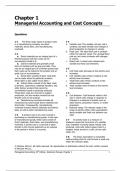Exam (elaborations)
solution manual for managerial accounting 18th edition by ray garrison eric noreen and peter brewer
- Course
- Institution
solution manual for managerial accounting 18th edition by ray garrison eric noreen and peter brewer a+ 2024
[Show more]



